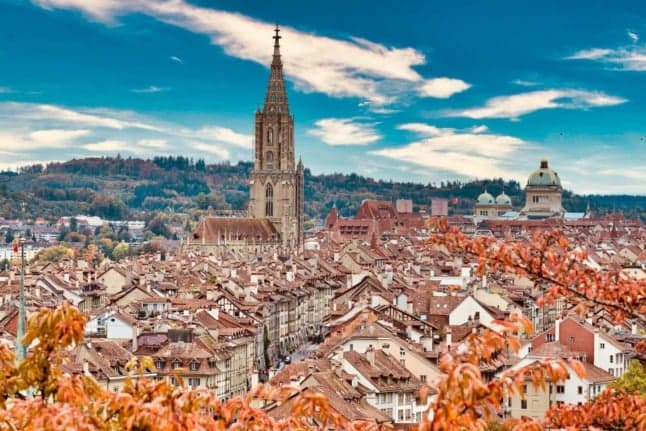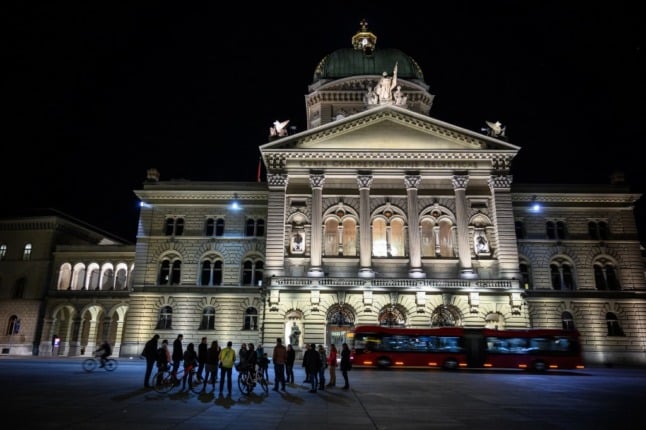Why is Bern the 'capital' of Switzerland?

It is smaller and less cosmopolitan than Zurich and Geneva. So how did Bern — also called Berne — end up being the political centre of Switzerland?
It may be a matter of semantics, but strictly speaking, Switzerland doesn’t have a “capital” as such. Bern’s official title is the “federal city” rather than the “capital city”, though to all ends and purposes, it is one and the same.
So how did Bern, rather than more logical choices like Zurich or Geneva, become the federal city?
Actually, before Bern became the seat of the government in 1848, this role rotated among several cities — very much like the role of the country's president rotates among the seven members of the Federal Council.
“In the fledgling Helvetic Republic the honour went, in 1798, to Aarau – for all of four months”, according to an article by the Swiss National Museum.
But “it soon became clear that there was not enough space in the little country town, and the capital was moved to Lucerne”.
Next, the title was passed on to Lausanne, followed by Fribourg, Solothurn, Basel, Bern, Zurich and again to Lucerne. “From 1815, this number was reduced to just Bern, Zurich and Lucerne, for two years each”, the museum’s records show.
When the newly elected parliament met for the first time on November 6th, 1848, the nascent federal state still had no capital. Several cities vied for the title, including Zofingen, a tiny town in the canton of Aargau.
Zurich and Lucerne were also in the running (Geneva never was), but MPs decided that the seat of the nation’s government should not be located in a major city. In the end, Bern got 79 votes, Zurich 38 and Lucerne 9.
However, not everyone was happy about this choice.
Many of the Bern’s citizens saw this development more as a burden than an honour. The small town had no infrastructure to speak of, lacking suitable venues to sit the government. It had to borrow money and impose an extraordinary tax to build the Federal Palace to house the parliament and the Federal Council.
And this is how Bern (and not Zofingen) became the capital of Switzerland.

The Federal Palace in Bern. Photo by Fabrice COFFRINI / AFP
Here are some interesting facts about Bern:
- The city was founded in 1191, exactly 100 years before the Swiss Confederation was established. Its Old Town was named a UNESCO World Heritage Site in 1983.
- With the population of about 130,000 people (and several bears living in its famous Bärengraben), Bern is Switzerland’s fourth-largest city, after Zurich, Geneva, and Basel
- As the seat of the government, Bern (both city and canton) is bilingual German /French.
- The name Bern is reportedly a form of “bear” (Bär in German), a heraldic animal that has become the symbol of the city.
- Aside from being the seat of the federal government and all its offices, Bern is also the headquarters of the international postal, telegraph, railway, and copyright unions.
- It was while he lived in Bern between 1903 and 1905, that Albert Einstein developed his theory of relativity, best known for its formula E = mc2. His house, located at Kramgasse 49, is now a museum.
READ MORE: Why does Switzerland use ‘CH’ and what does it mean?
Comments
See Also
It may be a matter of semantics, but strictly speaking, Switzerland doesn’t have a “capital” as such. Bern’s official title is the “federal city” rather than the “capital city”, though to all ends and purposes, it is one and the same.
So how did Bern, rather than more logical choices like Zurich or Geneva, become the federal city?
Actually, before Bern became the seat of the government in 1848, this role rotated among several cities — very much like the role of the country's president rotates among the seven members of the Federal Council.
“In the fledgling Helvetic Republic the honour went, in 1798, to Aarau – for all of four months”, according to an article by the Swiss National Museum.
But “it soon became clear that there was not enough space in the little country town, and the capital was moved to Lucerne”.
Next, the title was passed on to Lausanne, followed by Fribourg, Solothurn, Basel, Bern, Zurich and again to Lucerne. “From 1815, this number was reduced to just Bern, Zurich and Lucerne, for two years each”, the museum’s records show.
When the newly elected parliament met for the first time on November 6th, 1848, the nascent federal state still had no capital. Several cities vied for the title, including Zofingen, a tiny town in the canton of Aargau.
Zurich and Lucerne were also in the running (Geneva never was), but MPs decided that the seat of the nation’s government should not be located in a major city. In the end, Bern got 79 votes, Zurich 38 and Lucerne 9.
However, not everyone was happy about this choice.
Many of the Bern’s citizens saw this development more as a burden than an honour. The small town had no infrastructure to speak of, lacking suitable venues to sit the government. It had to borrow money and impose an extraordinary tax to build the Federal Palace to house the parliament and the Federal Council.
And this is how Bern (and not Zofingen) became the capital of Switzerland.

Here are some interesting facts about Bern:
- The city was founded in 1191, exactly 100 years before the Swiss Confederation was established. Its Old Town was named a UNESCO World Heritage Site in 1983.
- With the population of about 130,000 people (and several bears living in its famous Bärengraben), Bern is Switzerland’s fourth-largest city, after Zurich, Geneva, and Basel
- As the seat of the government, Bern (both city and canton) is bilingual German /French.
- The name Bern is reportedly a form of “bear” (Bär in German), a heraldic animal that has become the symbol of the city.
- Aside from being the seat of the federal government and all its offices, Bern is also the headquarters of the international postal, telegraph, railway, and copyright unions.
- It was while he lived in Bern between 1903 and 1905, that Albert Einstein developed his theory of relativity, best known for its formula E = mc2. His house, located at Kramgasse 49, is now a museum.
READ MORE: Why does Switzerland use ‘CH’ and what does it mean?
Join the conversation in our comments section below. Share your own views and experience and if you have a question or suggestion for our journalists then email us at [email protected].
Please keep comments civil, constructive and on topic – and make sure to read our terms of use before getting involved.
Please log in here to leave a comment.